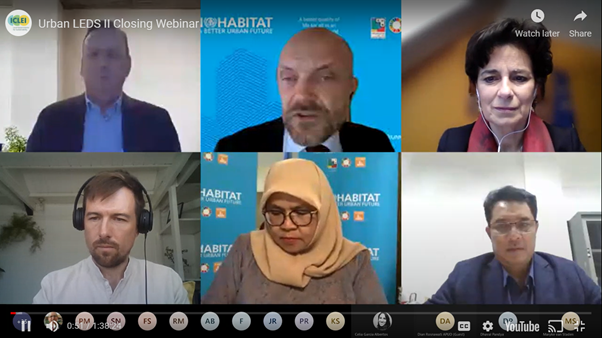Urban-LEDSII: Closure Webinar Highlights Capacity Building, Mainstreaming of Climate Action in City Planning

UN-Habitat and ICLEI jointly organized a virtual webinar on the 26thof January 2022 to mark the closing of the successful ‘Accelerating climate action through the promotion of Urban Low Emission Development Strategies’ project or Urban-LEDS II (2017-2021). Senior officials, representing project cities in several countries, discussed the key impacts and outcomes of Urban-LEDS and reflected on the lessons learned.
Under the project, UN-Habitat and ICLEI partnered with almost 60 cities and their respective national governments in Bangladesh, Brazil, Colombia, India, Indonesia, Lao PDR, Rwanda, South Africa, and across Europe to support multi-sectoral climate action and strategies. It supported integrated climate action in emerging economies and developing countries and facilitated South-South-North exchange.
In the Indian subcontinent, ICLEI South Asia and UN-Habitat jointly implemented the project in four ‘model cities’ – Rajshahi and Narayanganj in Bangladesh, and Nagpur and Thane in India – in addition to several ‘satellite’ cities in both countries. These cities were supported through action research and technical assistance to develop Climate Resilient City Action Plans (CRCAPs), integrate the action plans into regular budgetary and planning processes, and manage, monitor, and periodically report on city climate action.
The model cities also developed and implemented innovative pilot-scale technical measures across priority areas such as renewable energy, building energy efficiency, urban flooding, clean air, water resources, and biodiversity management. The model as well as satellite cities engaged in peer-to-peer learning and capacity-building activities through the Urban-LEDS II city network.
During the virtual event, Mr. Md. Shariful Islam, Chief Engineer of Rajshahi City Corporation, showcased various pioneering activities undertaken by the city with the help of the Urban-LEDS II project, which includes the plantation of over 1000 saplings of local and naturalized plant species, along with the Kolpona-Talaimari river embankment and energy efficiency improvement measures at the main administrative office building of Rajshahi City Corporation. The city also prepared a natural asset map and labeling of 1800 trees at various locations with support from the project. He said that Rajshahi intended to utilize the project outcomes to progress to the next level of transformative climate action. “There are significant data gaps for Rajshahi to plan and monitor climate resilience actions. Hence, implementing climate actions requires collaboration with local partners, including public and private sectors,” Mr. Islam added.